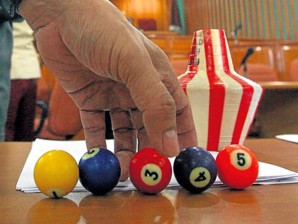
LUCK OF THE DRAW The Sandiganbayan uses colored balls and a bingo container to decide which of the antigraft court’s four divisions will handle the high profile corruption cases of former President Gloria Macapagal-Arroyo. The three cases landed in the court’s fourth division chaired by Justice Gregory Ong. MARIANNE BERMUDEZ
The graft cases against former President Gloria Macapagal-Arroyo have landed in a Sandiganbayan division headed by a magistrate considered so upright by court employees that he once fined himself P1,000 when his cell phone rang during a court hearing where he was presiding. Cell phones have to be turned off or put on silent mode when court is in session.
He was appointed by deposed President Joseph Estrada, and one that Arroyo unsuccessfully tried to nominate for a position in the Supreme Court.
Sandiganbayan Associate Justice Gregory Ong chairs the antigraft court’s 4th Division which drew the three Arroyo cases during a raffle yesterday. The other division members are Justices Jose Hernandez and Cristina Cornejo, who are both Arroyo appointees.
Ong, the most senior member of the Sandiganbayan who is known to be a stickler for rules, said there would be no special treatment for the former President and Pampanga congresswoman.
Arroyo is charged with violating the antigraft law and the code of conduct for public officials, for approving the controversial $329-million national broadband network contract with China’s ZTE Corp., also known as the NBN-ZTE deal.
“We will try it like any other case,” Ong said shortly after the raffle.
Arroyo’s coaccused in one of the graft cases are her husband, Jose Miguel Arroyo, former Transportation and Communication Secretary Leandro Mendoza and former elections chief Benjamin Abalos.
Abalos is already being tried by the 4th Division for an earlier graft charge stemming from the NBN-ZTE deal. The Ombudsman said the new case against Abalos was for violating a different provision of the antigraft law.
The 4th Division has 10 days to review the Arroyo cases and to determine probable cause. Should it find probable cause, warrants of arrest would be issued against Arroyo and her coaccused, according to Sandiganbayan spokesperson Renato Bocar.
If no probable cause is found, the cases will be dismissed, Bocar said. Arroyo and her coaccused would be eligible to post bail even before any warrant is issued against them, he added.
Almost sat in high court
Romulo Neri, the former socioeconomic planning secretary and former Social Security System president, was also similarly fined when his cell phone beeped when he was about to testify in the 4th Division.
Ong almost became a Supreme Court associate justice. In 2007, Arroyo appointed him to the high court only to withdraw his appointment papers when objections were raised from many quarters, including the Supreme Court itself, over the question of his citizenship.
The Constitution requires that all members of the Supreme Court and other collegiate courts to be natural-born Filipinos. Ong’s birth certificate showed that he was a Chinese national, while a Bureau of Immigration document said that he was a natural-born Filipino.
Ong, who was born in San Juan City on May 25, 1952, admitted to the discrepancies, but said the immigration certificate of identification should prevail over his erroneous birth certificate.
Relinquished appointment
As the controversy simmered, Malacañang announced that Ong had voluntarily relinquished his appointment “in order to give the President a free hand to appoint another to the Supreme Court.”
The Supreme Court later ruled that Ong could not sit in the high court until he had shown that he was a natural-born Filipino and had, through a court process, corrected the entry in his birth certificate stating that his citizenship was Chinese. But the ruling did not invalidate his position in the Sandiganbayan.
A Pasig City court later declared Ong a Filipino, and the Supreme Court subsequently denied a petition that questioned the lower court’s ruling.
Coincidentally, Jose Miguel Arroyo’s lawyer, Ferdinand Topacio, had filed in 2007 a petition at the Supreme Court seeking Ong’s disqualification from the Sandiganbayan because of questions over his citizenship. The petition was dismissed.
High-profile cases
Ong, who finished law at San Beda College in 1979 and took a master’s degree in law at the Manuel L. Quezon University in 1990, was appointed to the Sandiganbayan in 1998 by Estrada. Before joining the antigraft court, he was a Pasig regional trial court judge, appointed by former President Fidel Ramos.
He started his career in government as an assistant city prosecutor in Manila, a post he held until 1993. He is scheduled to retire from the Sandiganbayan in 2023.
Ong has handled several high-profile cases in the antigraft court, including the perjury conviction of former military comptroller Carlos Garcia, and the graft conviction of former Parañaque Mayor Joey Marquez over the anomalous purchase of broomsticks. Marquez’s conviction was later reversed by the Supreme Court.
In December 2005, Ong, in a resolution, said the Sandiganbayan had enough evidence for an ill-gotten wealth case against Imelda Marcos, the widow of the dictator Ferdinand Marcos, in a P200-billion lawsuit filed by the government.
However, in May 2006, the Supreme Court ordered Ong to recuse himself from the Imelda Marcos case after he reportedly said that he would dismiss the case because it was unwarranted and that he found chief witness, former Solicitor General Francisco Chavez, to be arrogant.
Originally posted: 11:04 am | Monday, January 2nd, 2012